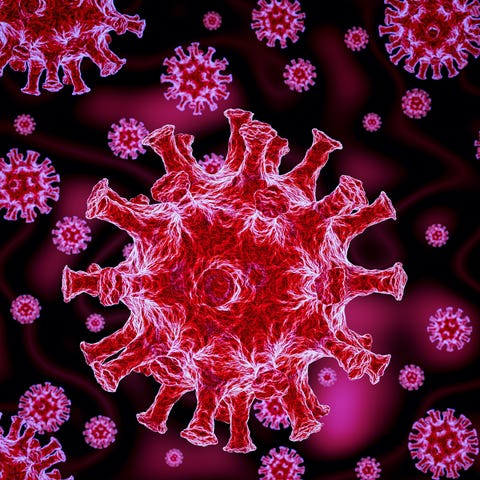Coronavirus: everything experts know so far about COVID-19
Key coronavirus symptoms, potential treatments, plus tips on how to prevent COVID-19 from spreading.

The coronavirus outbreak is continuing worldwide. It has been labelled a pandemic by the World Health Organisation (WHO).
Infections have now exceeded 2 million cases globally with over 170,000 deaths. The US, Italy and Spain are the countries with the highest infections. These countries overtook mainland China, where the novel strain of coronavirus first surfaced last year.
Initially known as 2019 Novel Coronavirus, the disease is now called COVID-19. It is caused by infection from the new severe acute respiratory syndrome coronavirus 2 (SARS-CoV-2), one of many coronaviruses that can infect humans.
This respiratory infection – which has never been identified in humans before – is believed to have originated in a seafood wholesale market in the city of Wuhan, China.
Here’s everything you need to know about SARS-CoV-2, including the key symptoms, potential treatments, and tips on how to prevent the spread of infection:
What is coronavirus?
Coronaviruses are a large family of viruses that can infect your nose, sinuses and upper throat. They’re classified as zoonotic, which means they are transmitted between animals and people. While most coronavirus strains only cause mild flu-like symptoms during infection – the common cold, for example – others such as Severe Acute Respiratory Syndrome (SARS) can morph into a pandemic.
Almost everyone will get a coronavirus infection at least once in their life, often as a child,’ explains Dr Adam Abbs, GP at Medicspot. ‘Most coronaviruses are not dangerous, although some types can be serious. Viruses mutate all the time – this is why we need a new flu jab each year.’
COVID-19 is approximately 96 per cent identical to a bat virus discovered in southern China, according to the latest research from the Wuhan Institute of Virology. It’s also related to SARS, sharing 80 per cent of its genetic sequence.
‘Human coronaviruses most commonly spread from an infected person to others through droplets produced from coughing and sneezing, or close personal contact, such as touching or shaking hands,’ adds Dr Luke James, medical director for Bupa UK.
Coronavirus symptoms day-to-day
The symptoms of COVID-19 appear to range in severity. Where some people suffer mild flu symptoms, others have contracted viral pneumonia, which is resistant to antibiotics and therefore difficult to treat. However, most people infected are likely to fully recover, just as they would from a flu.
‘Symptoms of the coronavirus are similar to other upper respiratory tract infections. This includes coughing, a runny nose, a sore throat and sometimes a fever,’ explains Dr Abbs. ‘In most cases, it is not easy to tell, without testing, whether you have a coronavirus or another cold-causing virus, like rhinovirus. This new COVID-19 strain, however, appears to have the fever and cough as the most prominent symptoms.’
coronavirus spread?
The outbreak of COVID-19 has spread rapidly over the last few months. It appears to spread through person to person transmission in close proximity via respiratory droplets.
It is also believed to transfer via surfaces, such as when an infected person touches a surface. If a healthy person touches the contaminated surface and then touches their face, they too could become infected. Current evidence suggests it may remain viable for hours to days on surfaces made from a variety of materials, according to the Centre for Disease Control and Prevention (CDC).
Coronavirus treatment
For the majority of people who will become infected with COVID-19, the infection will be mild and they will make a full recovery as they would from a regular flu.
The government advice for people who experience coronavirus symptoms is to not go to a GP, hospital or pharmacy. For medical advice use the NHS 111 onlinecoronavirus service.
If you live alone and experience coronavirus symptoms, it is recommended you self-isolate for 7 days from when your symptoms started. If you still have a high temperature after 7 days, you need to continue to self-isolate until it has returned to normal.
If you live with others, everyone in the household should isolate for 14 days from the day when the first person experienced symptoms. If a household member develops symptoms, then they need to remain in isolation until at least 7 days after their symptoms commence.
‘While there are no approved antiviral medicines for coronavirus, it can be treated in the same way as the flu, by treatment of the symptoms and monitoring for complications,’ says Dr Abbs. ‘It is recommended that people with coronaviruses get plenty of rest and drink fluids. Over-the-counter medicines for sore throat and fever can also provide some relief.’ Paracetamol is preferred as a first choice medication to ease symptoms due to the possibility that ibuprofen may potentially make the infection worse. If you are taking ibuprofen or other medications from the same family (non-steroidal anti-inflammatory medications) for other medical reasons, then you should continue them as normal.
Coronavirus prevention
How can you reduce your risk of contracting the virus? First of all, don’t panic. ‘It’s important to remember that the UK is monitoring the situation closely,’ explains Dr James. With that said, a little basic hygiene goes a long way.
‘You can help prevent a coronavirus infection in the same way as you reduce your risk of developing the common cold,’ says Dr Abbs. ‘This includes frequently washing your hands thoroughly with warm soapy water, avoiding close contact with people who have the infection and avoiding touching your eyes, nose and mouth.
- You can reduce your risk of coronavirus and help to protect those vulnerable people around you by following the government’s instructions for staying at home.

